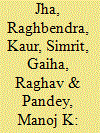| Srl | Item |
| 1 |
ID:
110251


|
|
|
|
|
| Publication |
2012.
|
| Summary/Abstract |
This paper investigates the endogenous linkages between farmers' machinery investment decision and off-farm employment in China. Both the theoretical model and the empirical results based on a survey of 453 households in Anhui Province indicate that agricultural labor input and small-sized machinery investment are gross complements rather than substitutes when machinery services are available in the market. Consequently, farmers with small-sized machinery are more likely to reduce their off-farm employment time. On the other hand, an increase in off-farm employment is more likely to reduce the possibility of possessing small-sized machineries mainly due to substitution effects of market machinery services.
|
|
|
|
|
|
|
|
|
|
|
|
|
|
|
|
| 2 |
ID:
131244


|
|
|
|
|
| Publication |
2014.
|
| Summary/Abstract |
The workfare scheme, the National Rural Employment Guarantee Scheme (NREGS), and the direct food subsidy programme, the Targeted Public Distribution Scheme (TPDS), represent two social safety nets instituted in India as anti-poverty measures. This paper examines whether from the point of view of individual households the two programmes are substitutes or complements, as this will shed light on the appropriateness of the design of the two programmes. Based on primary household data collected for the Indian states of Rajasthan and Madhya Pradesh (MP), we show that, in Rajasthan, a large percentage of households consider TPDS and NREGS programmes to be substitutes for each other, while in MP the households often perceive the two programmes as complements. Thus it appears that the two programmes are better designed in MP since an incentive for participation in one programme has desirable side effects on participation in the other. Correlates of participation in the two states are identified and the paper advances several policy conclusions.
|
|
|
|
|
|
|
|
|
|
|
|
|
|
|
|